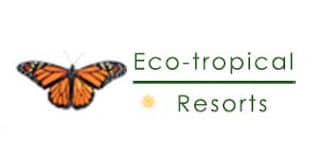People are asking us how we are eco and sometimes I don’t even know where to start or what to tell – there are many aspects to it, some a bit contradictory and others that go for me without saying.
Sustainable Practices we use
Our main focus is our environment – the nature around us – and to leave it as untouched as possible.
Energy
This meant for us from the beginning the use of renewable energy with the aim to use less than 5% of the time fossil fuel and ONLY to retreat to it as an emergency backup (either for very bad weather or problems with the regular system). Wind and solar are a great combination for electricity right at the coast only 5 degrees south of the equator – 12 hours of sun each day and most of the year also some hours of good wind in the evenings – which also makes great weather for visiting by the way.
Water
Responsible use of water and re-use of waste water is something deeply ingrained in our behavior, having lived in Israel for a long time. Our grey water goes for watering the bush on the plot, the black water is recycled in regular septic tanks and after that filtered through sand and going back to nature as well. Saving water goes for us without saying since the only source of water at Tembo Kijani is the rainwater that is trapped in the ground around 4m below ground level. Years without good rain are hard and responsible use of the water that we have is more important than ever.
Environment
The third big aspect of our ecolodge is the way we built it. The plot is a bit more than 6 acres. Most of it is thick bush, even though it is located right at the beach of the Indian Ocean. The first half year we were busy cleaning up dead trees and crawling through the woods to find spots without trees yet big enough for our guest units. Of course, they were not the same size. Therefore, we designed all of the bandas slightly different so that they would blend in with the surrounding nature.
Guidelines for Building
But how to build? Which materials to use? Where to get them from? These were the real challenges. Our two big guidelines were to use materials that are natural and easily available. And secondly to use as little cement as possible. Besides this, we had to take into consideration that the materials should fit into the environment of bush and beach, not rust or rot and being more or less immune against all the insects and termites around here. So, for example, we ruled out gypsum board from the beginning since: First of all, its production produced too much CO2. Secondly, it is not water proof, as well as not being easily available. And believe it or not, the local ants here are able to eat it!
The first materials of wooden poles for the restaurant was ordered just before the rainy season. A big mistake, as we later figured out. The truck that was supposed to deliver them, got stuck where they were cut. They sent a heavy duty 4WD tractor in to pull it out, but then this one got stuck as well. So – no more heavy duty vehicles around the area and the only solution was to wait until the rain was over. After two months of waiting, the poles arrived at our plot and construction began.
Being Green in Africa – a bit different than in the Western World
After living in Tanzania for 2 years we figured out that establishing something “eco” is not so easy. That being “green” is not as easy as it is in the Western world. There it is possible to recycle bottles, buy products that are “green”, change your electricity provider to get renewable energy or buy a hybrid car. There are certain things that are almost impossible here in Tanzania. Like living in the middle of the bush and driving a hybrid car. Even the regular 4×4 cars are falling to pieces and spare parts are hard to get. Also that our choices were difficult. Either using imported biodegradable soap (and being responsible for high CO2 emissions from the transport) or using local soap with lots of phosphates. Another thing to consider was what to do with garbage. There is no recycling or composting. The only way to get rid of it here is to burn it, because there are no trash collection services.
But being eco is not only how we do things here and what we use or even to choose between the lesser of two evils, but of course also what we convey to our guests.
So we installed a charge controller for the solar island system in each guest unit with smiley faces and a display so that our guests can see in their bandas and bungalows how much electricity is produced by the solar panel on their roof and how much they already used. Aluflasks are given to each guest to refill for free with filtered water and so to avoid the plastic from bottled water. The food, that we use in our lodge, is bought from the local markets and sometimes you are lucky to see the fishermen in the morning who bring the fish for the evening.
We don’t only want your stay as a guest at Tembo Kijani being “greener” than at other places, but we want to leave you with a different understanding of “being green” and a Green Africa.
For more information about this unique lodge in Tanzania:
Tembo Kijani – Pangani EcoLodge
